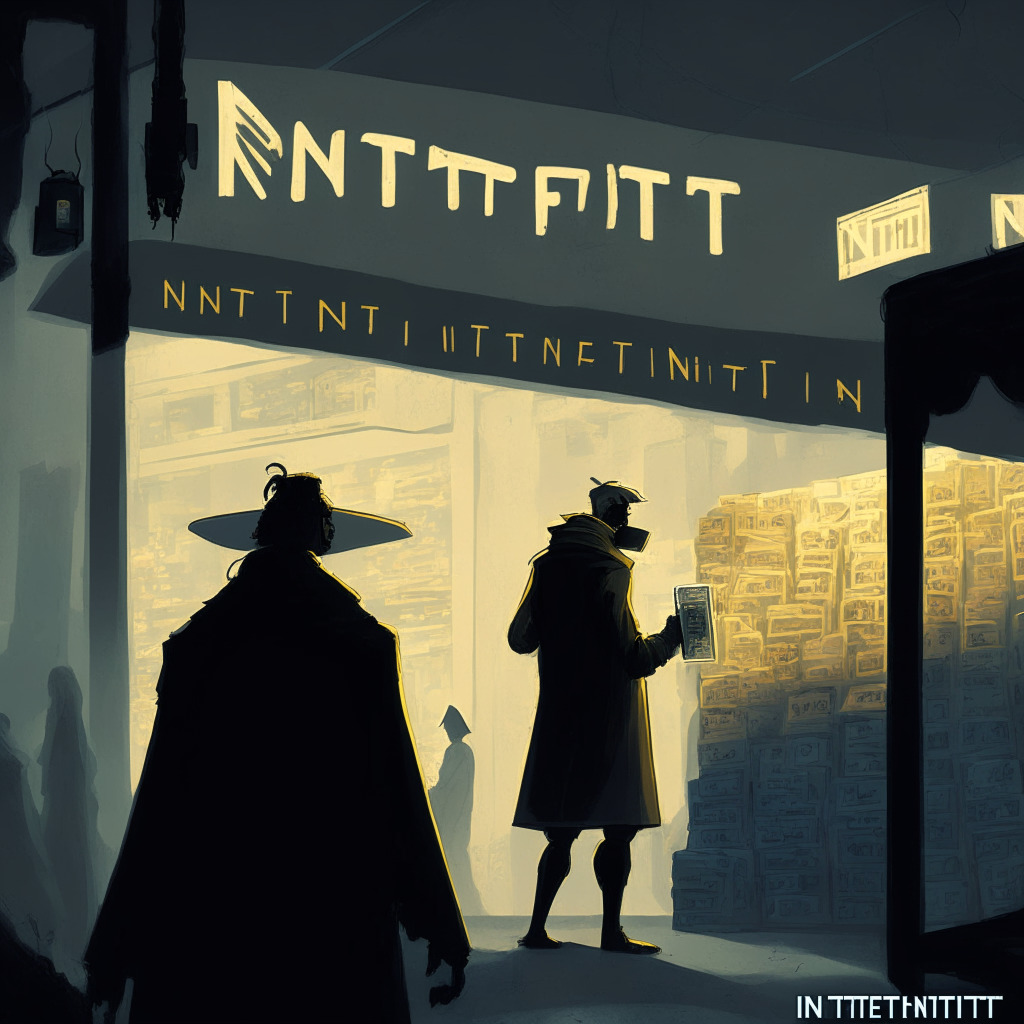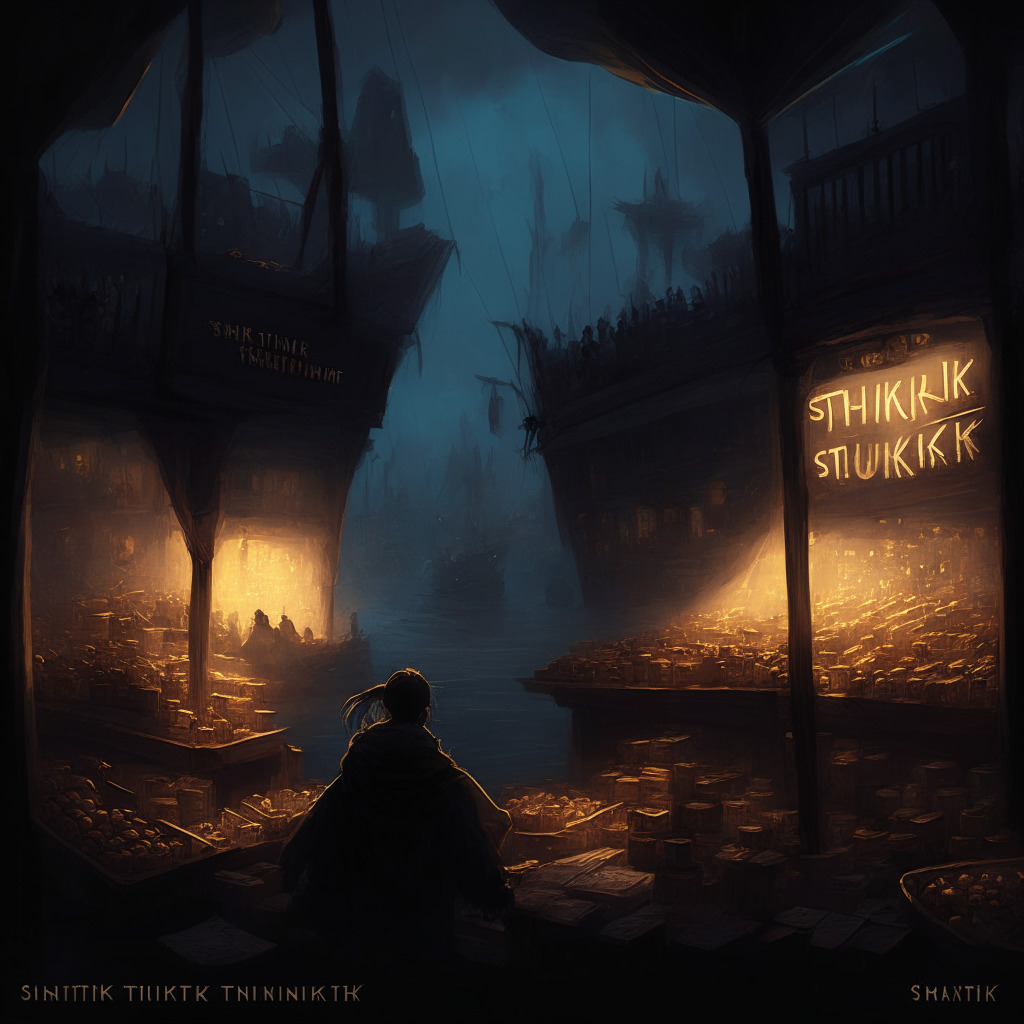“Digital currency and adult entertainment sectors face increasing scrutiny from regulators, influencing crypto platforms to implement rigid KYC and AML protocols. This leads to professionals being blacklisted, and platforms like SpankPay and WetSpace struggling to secure banking partnerships.”
Search Results for: blur
Navigating the Digital Ruble: Russian Banks Seek Clarity Amid Crypto Confusion
The Association of Russian Banks (ARB) is seeking clarity from Russia’s Central Bank on the eminent launch of Central Bank Digital Currency (CBDC), or digital ruble. In response to rising citizen apprehension, ARB is lobbying for specific regulations, such as prohibiting forced creation of digital ruble wallets and caps on digital ruble operator tariffs. However, ambiguity abounds regarding CBDC’s definition and potential global compatibility.
Turning The Tables: NFT Trader Outsmarts Bot For Surprising 800 ETH Profit
NFT trader, Hanwe Chang reportedly made 800 ETH (~$1.5m) by tricking a bot on Blur, an NFT marketplace. Testing the bot’s patterns, Chang inflated his own NFT prices, leading to unexpected profit. However, it’s cautioned that such practices can potentially be seen as illegal activity.
Brawn and Bots: Perils and Potential of Today’s NFT Marketplace
A trader outsmarted a bot into buying his overpriced NFTs, gaining a lucrative 800 ETH ($1.5 million). This strategy has sparked conversations about its legal implications. Meanwhile, July saw a decrease in NFT volumes, causing concern among creators. Despite this, Gary Vaynerchuk recently entered the NFT space, partnering with Reebok.
NFT Market Conflicts: Lower Royalty Rates Threaten Artist Engagement Amid Trading Surge
Tensions escalate in the NFT market as leading exchanges lower royalty rates for artists to boost trading activity amid a significant market downturn. However, this makes maintaining creators’ enthusiasm to produce new digital artworks more difficult, potentially further impacting the market.
Elon Musk’s Stand on Free Speech: A Gamechanger for Social Media or a Potential Legal Nightmare?
“Musk’s commitment to defend users arbitrarily punished by employers over opinions expressed on his platform, X, could redefine interactions between social media and users. His pledge that X will shoulder legal fees for injustices resonates with many, but also raises concerns about responsibility and accountability.”
Bandai Namco’s AI-Powered Virtual Pet Game: A Blockchain Revolution in the Gaming Industry
Bandai Namco, in partnership with startup Attructure, launches AI-powered virtual pet game RYUZO, featuring digital creatures or RYUs on the blockchain network, the Oasys Network. The game employs use of ‘Soulbound Tokens’, ensuring uniqueness and prohibiting unauthorized transfers, and furthermore offers potential for trust-building within the Web3 community.
Worldcoin Vs. Privacy Watchdogs: A Crossroad of Cryptocurrency, AI, and Regulation
“Worldcoin’s data collection methods, which involve iris scans for a digital ID and free cryptocurrency, are raising privacy concerns. Despite mixed views on these practices, questions arise about the state and survival rate of systems underpinning data practices in an increasingly digital future.”
Simulation Theory – Reality Unraveled or Futuristic Illusion?
“This theory, known as simulation theory, posits that our reality, with all its intricacies and grandeur, might be nothing more than a complex computer simulation. The narrative that humans could be living in an uncannily realistic virtual realm is not new.”
Cryptocurrency Crossroads: Santos Scandal Meets RFK Jr’s Bitcoin Vision
“The Santos incident reveals a complex intertwining of political intrigue, crypto manipulation, and scams, while figures like Robert F. Kennedy Jr. demonstrate a supportive stance towards cryptocurrency. This highlights the intersection of politics, regulation, and digital finance in unanticipated ways.”
Bank of Italy’s DeFi Experiment: A Landmark in Blockchain Implementation or Regulatory Challenge?
“The Bank of Italy has partnered with Polygon and Fireblocks to create a regulated platform for ‘institutional DeFi’, a first of its kind. This initiative envisions larger-scale tokenized asset projects, despite significant regulatory challenges and skepticism towards digital assets. Supported by traditional financial institutions and technology companies, this marks a shift in the future of finance.”
Unveiling EU’s First Tokenized Equities: A Game-changer or a New Challenge?
Securitize has issued the first tokenized equities under the EU’s digital assets framework via the Avalanche smart contract network. These tokens represent equity in Mancipi Partners, a Spanish real estate investment trust. This move signifies a blending between traditional capital markets and crypto, potentially signaling a shift in the financial landscape that could see the tokenized assets market reach $16 trillion by 2030. However, this emerging sector requires careful navigation with thorough regulatory oversight.
Worldcoin’s Controversy: Biometric Data Privacy Clashes with Crypto Innovation
“Controversial crypto project, Worldcoin, allows users to scan their irises in exchange for cryptocurrency. Despite an initial high interest, post-launch sign-ups reduced significantly, leading to questions about privacy and sustainability within the cryptocurrency arena and the potential exploitation of personal data.”
Alibaba’s Adoption of Meta’s AI Model Llama: Progressive Leap or Strategic Misstep?
“Alibaba, the first Chinese company to use Meta’s AI model Llama, signals a shift to zero-cost development programs. It raises questions about ties between China and Meta, and highlights complexities in the evolving landscape of AI adoption and open-source model integration. The role of such technologies in shaping our world remains to be seen.”
Crypto Giants Expand Globally: Business Strategy or Escape from Regulation?
“Cryptocurrency companies, like Bitget, are expanding their operational outreach globally with a focus on the Middle East and Asia-Pacific regions. This surge in overseas expansion might be a strategic response to increasing regulatory pressure in the U.S, or simply to capture developing markets.”
Unleashing the Potential of Tokenization: A Revolutionary Shift in Global Finance
“Tokenization transforms tangible or intangible real-world assets into virtual investment vehicles on the blockchain. Stocks may be traded round-the-clock, much like cryptocurrency. While tokenization sounds transparent and risk-free, it has potential pitfalls. However, traditional financial institutions can’t ignore the potential benefits of blockchain any longer.”
OpenSea’s Innovative ‘Deals’ Feature: A Game Changer for NFT Trades and Its Implications
OpenSea has introduced a new feature called “Deals”, a peer-to-peer NFT exchange tool, allowing collectors to supplement their transactions with wrapped ether (WETH). The feature aims at increasing trust for online transactions in the digital collectibles market providing a safe trading platform for prized crypto-assets.
Kuwait’s Cryptocurrency Prohibition: A Setback or Necessary Safety Measure?
Kuwait’s primary financial regulator, the Capital Markets Authority (CMA), has issued an “absolute prohibition” on most cryptocurrency activities, including payments, investments, and mining. They warned about the risks of virtual assets, highlighting cryptocurrencies’ lack of legal status. This major decision sparks debate about its efficacy in combatting money laundering and terrorist financing.
Ripple Effect of UK’s Crackdown on Crypto Memes: Freedom of Expression Versus Financial Regulation
The UK’s Financial Conduct Authority (FCA) warns that crypto memes may lead to criminal offenses if they breach financial promotion rules. The new directive highlights that any communication inviting or inducing investment activity can be deemed a financial promotion, including memes. This regulation may greatly affect the unregulated meme arena in the crypto industry.
Cryptocurrency Bounties Reinvents the Fight Against Crypto Theft: Privacy vs Justice
“Arkham’s new platform, “Intel Exchange”, designed for exchanging crypto bounties for information, raises concerns about privacy and security. Criticism suggests the exchange could potentially compromise anonymity principles inherent to cryptocurrency and invite exploitation by bad actors, despite CEO reassurances of high verification standards.”
Navigating Telegram’s Bold $270 Million Bonds Move: Gearing Up for a Blockchain Social Media Merge
Recognizing the potential of combining social media and blockchain, Telegram raised $270 million in bonds. Despite the platform gaining 2.5 million new users daily, profitability remains a challenge. The funds will support Telegram’s evolution until it becomes financially stable or reaches the break-even point.
Decoding Blockchain: An Egalitarian Boon or a Dangerous Game?
“Blockchain could revolutionize industries through decentralization and distributed computing, providing economic efficiencies and democratic freedoms. However, the technology also raises concerns around security, energy consumption, and regulatory issues. Despite obstacles, blockchain is undeniably carving a niche in the world economy.”
Ripple’s Partial Victory and the Complex Dance of Crypto Regulations: A Regulatory Tug-of-War
“The Ripple’s XRP token case indicates the evolving complexities in blockchain regulations, with the token classified as a non-security for digital asset exchanges but not for institutional investors. This dual classification signifies future regulatory challenges, but also presents opportunities for increased investor protection and transparency in the crypto sector.”
Unveiling the Dark Side of CBDCs: Financial Autonomy vs. Government Oversight in Brazilian Case Study
“The Brazilian central bank’s digital currency project may allow the government unsolicited control over citizens’ financial assets. Reverse engineering of the pilot project’s code, revealed capacity to freeze or adjust linked account balances, provoking concerns regarding the future of financial autonomy in Brazil.”
The SEC at the Crossroads of Crypto Regulation: The Ripple Case and its Implications
The US Securities and Exchange Commission (SEC) struggles with defining what deems a security in the cryptocurrency world. A recent ruling in SEC vs. Ripple differentiates the sale of XRP tokens from Ripple’s entrepreneurial efforts, challenging the SEC’s traditional norms.
US Court Verdict on XRP: Catalyst for the Altcoin Season or Gateway to Increasing Legal Uncertainties?
A US court ruling over SEC’s case against Ripple Labs ruled XRP as non-security for individuals but as a security for institutional sales, disrupting SEC’s uniform altcoin categorization. This led to BTC’s dominance rate drop, allowing altcoins like XRP, SOL, MATIC and ADA to gain significantly.
Humanizing AI: Steering Towards Empathy or Courting Disaster?
“Introducing human-like features in AI aligning with human values could create a reciprocal relationship between humanity and machines. However, we must weigh potential risks considering humans’ propensity for destructive actions. The confrontation lies in ensuring benevolent behavior from such superior entities towards humanity.”
Blockchain Revolution in Sports: The Rise of Interactive NFTs and New Digital Engagement Tactics
“Interactive Non-Fungible Tokens (NFTs) are changing the game for sports memorabilia, with digital-first approach providing accessibility to fans worldwide. Partnerships between sports icons, digital artists and sports organizations give birth to unique blends of sports data and digital art, while still questioning how to effectively display digital art.”
Navigating the Murky Waters of Metaverse Regulation: UK’s Online Safety Bill & Beyond
The UK House of Lords deliberates if metaverse should be governed by online safety regulations established in the UK’s Online Safety Bill, emphasizing the potential vulnerability of children and adults in these digital spaces. Variations exist in international regulations, raising standardization concerns and questioning the adequacy of traditional legal systems to address rapidly evolving digital spaces.
Navigating the Crypto Investment Landscape: Active vs Passive Strategies
“The ever-evolving landscape of cryptocurrency presents opportunities for various investment strategies ranging from simple buy-and-hold to complex discretionary management models. However, choosing between active and passive investment in crypto continues to present blurred lines due to risks and potential returns.”
Argentina’s Matba Rofex Dives into Crypto with Bitcoin Futures: A Leap worth the Risk?
“Matba Rofex, Argentina’s renowned stock exchange, has launched its first Bitcoin index-based futures contract, giving qualified investors regulated access to crypto markets. However, the inherently volatile nature of cryptocurrencies demands caution and vigilance from participants.”
SEC vs Crypto Exchanges: Striking a Balance between Innovation and Regulation
Prominent crypto investment firm Paradigm resists recent actions by the US Securities and Exchange Commission (SEC) challenging its authority to regulate secondary markets for crypto assets. Increased regulatory action, extending now to exchanges operational in secondary markets, indicates an expansion of SEC’s authority. Paradigm criticizes this as inconsistent regulation, potentially damping the entrepreneurial spirit of crypto exchanges.































